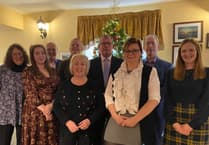Sustainable Powys is a concept rather than a clearly defined programme of works, an internal auditor has said.
At a meeting of Powys County Council’s Governance and Audit committee on Friday, May 23, members received an internal audit report from SWAP (South West Audit Partnership) who had evaluated the “delivery arrangements” for Sustainable Powys.
For more than two years, work has been taking place behind the scenes at the council on a range of proposals to slim down services in response to the funding crisis facing local authorities in Wales and beyond.
This is being done in the belief that anywhere up to £60 million needs to be shaved off the council budget during the next five years.
Apart from agreeing that council services will be based around five core towns, little detail on the future shape of Powys County Council has really emerged.
SWAP assistant director, Ian Halstead, explained: “This report focuses on the arrangements, the controls and processes and framework in place.
“This is not around the delivery and performance of Sustainable Powys itself.
“Sustainable Powys is not a policy or programme, which I think has caused some misconceptions at times.
“Rather it is an initial concept that’s been developed over time and sits in existing governance and management frameworks.”
He explained that the “initial frustration” for committee members around the lack of “early progress and delivery” had been because of a lack of “detailed information” of what Sustainable Powys is supposed to be.
Mr Halstead explained that Sustainable Powys is a “delivery approach” which means that projects that come under its wing can stand alone and have their own reporting and governance frameworks.
This means that the council is “not going to report specifically on Sustainable Powys,” explained Mr Halstead.
Mr Halstead said: “It’s one of culture and cultural change takes time to do.”
“I have given the audit a high reasonable opinion, which means there are sound systems and controls in place with two main areas of improvement,” he said.
The first is around communication and the second area for improvement is around the “consistency and timeliness” of each service’s integrated business plans.
Director of corporate services Jane Thomas said: “This piece of work has looked at the foundations and the arrangements we have in place.”
Ms Thomas added that the committee will soon see “a whole host of projects” going through that governance structure and decision making process.
She stressed that council transformation projects that have been ongoing for some time including school reorganisation, digital transformation and social services changes can all come under the Sustainable Powys banner.
Committee chairwoman and lay member, Lynne Hamilton said: “I really welcome this report, and I would like this committee to have an ongoing role in seeking assurance and examining the ongoing risk profile of the programs and projects underpinning the ambition of Sustainable Powys.
“That’s the lens through which we will continue to examine progress on Sustainable Powys.”





Comments
This article has no comments yet. Be the first to leave a comment.